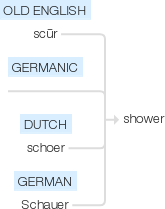Shower
Old English scūr ‘light fall of rain, hail, etc.’, of Germanic origin; related to Dutch schoer and German Schauer .
wiktionary
From Middle English shour, from Old English scūr, from Proto-West Germanic *skūru, from Proto-Germanic *skūrō, probably from Proto-Indo-European *(s)ḱēwer-(“north; north wind; cold wind; rain shower”). Cognate with Dutch schoer, German Schauer, Norwegian skur.
From show + -er.
etymonline
shower (n.1)
Old English scur "a short fall of rain, storm, tempest; fall of missiles or blows; struggle, commotion; breeze," from Proto-Germanic *skuraz (source also of Old Norse skur, Old Saxon and Old Frisian scur "fit of illness;" Old High German scur, German Schauer "shower, downpour;" Gothic skura, in skura windis "windstorm"), from PIE root *kew-(e)ro- "north, north wind" (source also of Latin caurus "northwest wind;" Old Church Slavonic severu "north, north wind;" Lithuanian šiaurus "raging, stormy," šiaurys "north wind," šiaurė "north").
Of blood, tears, etc., from c. 1400. Of meteors from 1835. Sense of "bath in which water is poured from above" first recorded 1851 (short for shower-bath, itself attested from 1803). Meaning "large number of gifts bestowed on a bride" (1904, American English colloquial) later was extended to the party at which it happens (1926). Shower curtain attested from 1914.
shower (v.)
1570s, "come down in showers;" 1580s, "to discharge a shower," from shower (n.1). Intransitive sense from 1930. Related: Showered; showering.
shower (n.2)
"one who shows," Old English sceawere "spectator, watchtower, mirror," agent noun; see show (v.).
